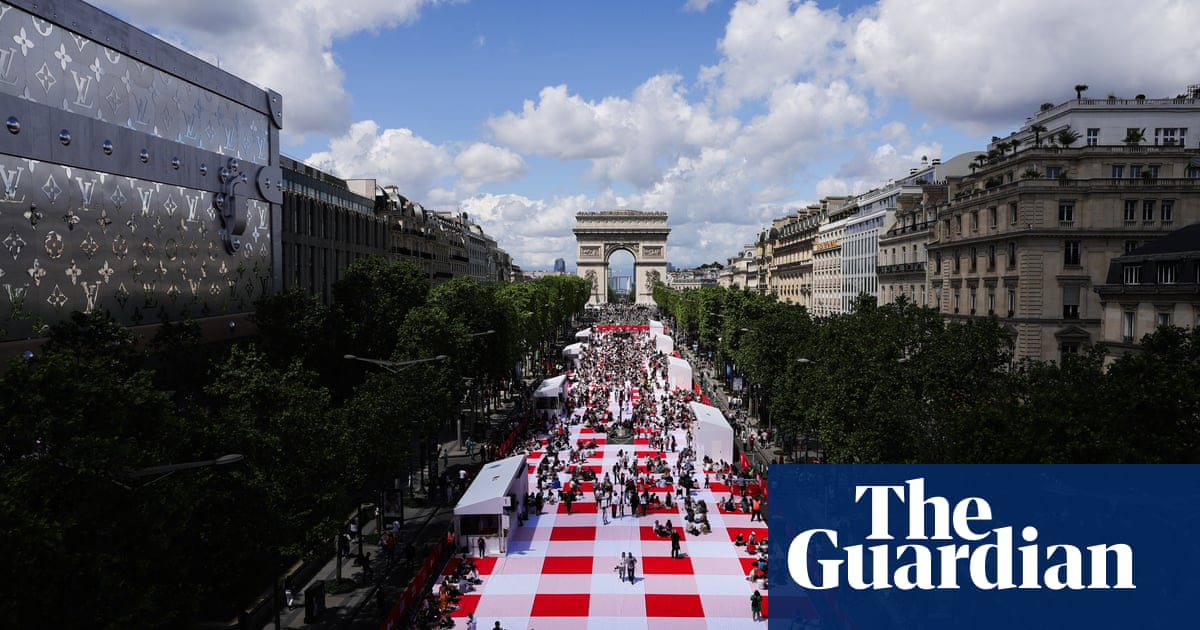
Thousands of people have gathered on the Champs-Élysées for a giant free picnic organised by a committee of local traders and businesses fighting to halt the slow decline of the boulevard long known as “the most beautiful avenue in the world”.
Once a favourite promenade for Parisians, the Champs-Élysées has in recent years been steadily abandoned by local people as popular stores and cinemas have given way to luxury boutiques and the avenue has become the preserve of wealthy tourists.
“It’s a way of telling Parisians: ‘Come back to the Champs-Élysées,’ to show them that the avenue isn’t just for high-end shopping,” said Marc-Antoine Jamet, head of the 180-member Champs-Élysées committee that organised the event.
About 273,000 people applied to take part in “le grand pique-nique”, with 4,400 selected to sit with up to six guests each on a 216 metre-long red-and-white checked picnic blanket, described by organisers as “the world’s largest tablecloth”.
Eight partner restaurants – including the revered Fouquet’s brasserie, for decades a haunt of French film and music stars – provided meals for two separate sittings ranging from ham baguettes to caesar salads, crudités and macarons.
“Thousands of people picnicking on one of the world’s best-known avenues, within sight of the Arc de Triomphe – that’s a true popular and gourmet celebration,” said the event’s guest of honour, the former Élysée Palace chef Guillaume Gomez.
Picnickers were enthusiastic. “The sky’s blue, the sun’s out, we’re sitting in the middle of the Champs-Élysées. We’re pretty lucky, no?” Fabien, who had travelled in specially from outside Paris with his wife, Michelle, told BFM TV.
“And the picnic’s really good – I got a Ladurée macaron,” said Léo, 14.
The committee has repeatedly warned that the iconic avenue has “lost its splendour” over the past 30 years, falling victim to changing consumer habits but also crises including the gilets jaunes (“yellow jackets”) protests and the pandemic.
Last year it transformed the Champs-Élysées into an open-air mass dictation fest with 1,800 desks laid out along its length in another exercise aimed at “re-enchanting” Parisians with the avenue, the backdrop to countless films.
It has, however, been many years since – as the French-American singer Joe Dassin crooned in a celebrated song in the late 1960s, when the avenue was at the height of its popularity – “You’ll find everything you want on the Champs-Élysées”.
The avenue’s last cinema, the UGC Normandie, which opened in 1937, will close next month, the third cinema to shut in recent years amid declining ticket sales and what UGC called a “significant change” in the demographic of Champs-Élysées visitors.
As entertainment venues and book, record and clothing stores have vanished, they have been steadily replaced with luxury and upmarket sporting goods outlets, for whom an address on the avenue retains considerable pulling power – particularly for tourists.
The French luxury group LVMH – owners of Louis Vuitton and Dior – paid more than €1bn for its recently acquired head store on the Champs-Élysées, according to estate agents, with surveys showing up to a quarter of all visits to the avenue are now dedicated to luxury-brand shopping.
Ronan Guevel, who has lived off the avenue for more than 20 years, told France Info radio: “When I was young we used to like going out [to the cinema] on the Champs. There must have been seven or eight on the avenue. Now the last one’s going.”
Another cinema had recently been replaced by a Lacoste sportswear store, Guevel said: “The shops and venues Parisians used to use have been replaced by brands you can find pretty much anywhere. The Champs-Élysées are losing a bit of their soul.”
With more than 1.3 million people strolling along the avenue every month property prices have soared, forcing smaller independent and less profitable shops and venues to hand back their keys in the face of rents that have risen 15% in the past year alone.
“Property speculation is the big issue,” said Paris councillor Nicolas Bonnet-Oulaldj. “The price per square metre is simply too high. We’re going to have to call on the government for help in regulating and restraining rents in this part of the city.”
Paris city hall is working on a €250m (£225m) plan aimed at turning an eight-lane urban highway into an “extraordinary garden”, but the bulk of the work is not due to start until after this summer’s Olympic Games.
Some minor improvements to the avenue are also being made before the Olympics, with terraces rearranged along its length and more space allocated to pedestrians.
The Champs-Élysées committee is itself due on Monday to present a 1,800-page report on 150 suggestions for reimagining the boulevard, aimed at “guiding a more radical and wholesale transformation” of the neighbourhood, Jamet said.








